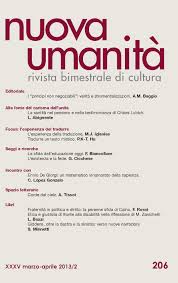Stefano Fontana
Baggio speaks fairly well about the non negotiable principles, but also tones them down, and ends up concluding in favor of their being negotiable. Non negotiable, however, means exactly that: non negotiable. They imply a “I can’t!”.
These truths, he says, “must not be considered like untouchable idols, but are always understood better in the course of history. It is the duty of each generation of citizens to ponder and pose questions about the contents and the formulation of these foundations”, because to understand does not mean to negotiate. But he concludes saying: “The moment to negotiate will then come, as is necessary, in the places institutionally deputed to do so, and will end with a majority decision. This is the “wisdom of democracy, which imposes the making of a decision because society needs it; and everyone accepts the decision of the majority precisely because no one claims that it establishes a truth”.
Let’s take this step by step. It is true that the great ethical absolutes are learned in history. In what other dimension do we live if not? Nonetheless, the moral conscience of humanity is able to comprehend ethical truths always valid and hence endowed with absolute moral value. In history, also thanks to the decisive contribution of Revelation, we learn something that transcends history.
The democratic majority does not establish the truth. Baggio as well acknowledges this. Nonetheless, he then founds on this the fact that all must accept a decision made by the majority, excluding even conscientious objection. What happens here is that democracy is absolutized, not because it claims to incarnate the truth, but, on the contrary, because it doesn’t. Democracy does not determine the truth, but has to do with the truth, which passes judgment on its decisions. This is why Catholics will withdraw from institutions “deputed to negotiate” when the negotiation process focuses on non negotiable things, on things not at their disposal.
What actually are the non negotiable principles? According to Baggio they are the ones listed by the Ratzinger Note of 2002. Fine, I agree. The author then says they have to be taken all together, with neither primary nor secondary ones, and have to be used with prudence. They express “the complete vision of the human being”, which is always difficult to bring into focus, and so much so that there are many political parties, each aware of its respective partiality.
Once again let’s go step by step. In my opinion, there is a difference between the first three non negotiable principles (life, family, freedom of education) and the others indicated by Ratzinger in 2002. The first three have directly to do with the construction of humanness and present negative absolutes. In fact, in other places Benedict XVI cited these three alone. By way of example, let’s consider solidarity in subsidiarity, or else the principle of peace. Many are the ways to realize them. But the suppression of a conceived being places us face to face with an either-or. Is there anything to negotiate? I either say yes, or I say no. Moreover, the other three depend on the first three, and cannot be realized unless the first three are so beforehand.
This brings us to prudence. Prudence has to do with the means, not the ends. Faced with the killing of a conceived being, could Baggio tell me what type of prudence, or what choice of means a Catholic should apply? If the end is absolutely wrong, or if it isn’t an end, which means am I supposed to prudently assess? The non negotiable principles don’t claim to tell us everything about the human person, but rather to tell us what are the aspects without which ‘it’ isn’t a human person, and which we are obliged to respect in an absolute manner always and under all circumstances. If the complete panorama of man is not given to us – at least down here – these aspects are given to us in all their clarity and mandatory nature.
It is true that political parties express partial positions regarding man. This is exactly the reason for the need to enlighten what they do with something that isn’t partial. Vice-versa, everything would be partial (and relative) in politics. Baggio has a strange view of political prudence: “The non negotiable principles are clear for Catholics, but it is much more difficult to decide how to translate them into laws, into operational decisions, into a political vote. So much so that Catholics apply the criterion of prudence in a very different manner, choosing very different political programmes and parties”. But this is imprudence and cannot be argued as proof of wisdom. Here’s a question I ask myself: how can a party whose platform includes the expansion of Law 40 or fast track divorce be a means for ensuring respect for the non negotiable principles of the defence of life and the family? Look’s like rather imprudent political prudence.
Nonetheless, I believe I understand what Baggio means. Since there are six or seven non negotiable principles, I think he considers political prudence as a sort of weighing them and keeping them all together. In brief, Baggio as well transforms the principles into values fit to be weighed in order to find the mix suited to the situation, while always waiting, quite naturally, for the verdict of the majority, which is not refused because it represents the “wisdom of democracy”. In the face of an “abominable crime” such as abortion, what mix do we want to create?
When reading reflections such as these by Baggio it becomes abundantly evident why the recent elections went the way they did, especially as regards the conduct of Catholics.






